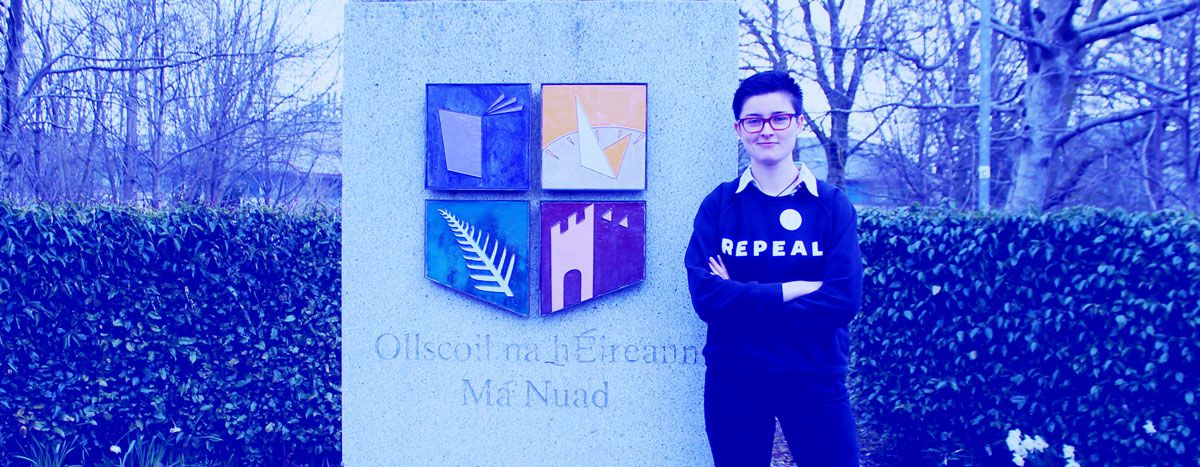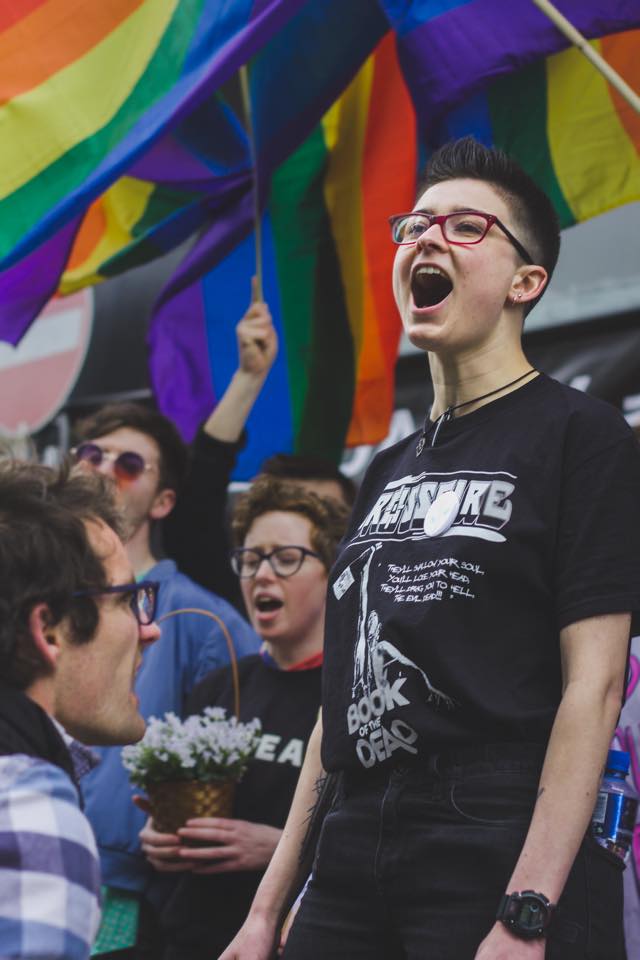
The student who dropped everything to fight for legal abortions in Ireland
Published on
Jennifer Keane Molloy, who has dedicated a year of their life fighting for the legalisation of abortion in Ireland, is tired. Although the country overturned the abortion ban on May 25th, there is still a lot of work to do. So what was it like to be there, on the ground, in the midst of mass mobility this past May?
“Anger is what drives people, it’s definitely what’s driving me,” Jennifer Keane says during our first interview. Put simply, Jennifer is a maths and physics student at Maynooth University in Ireland. But that’s a dry and studious description of them (_Jennifer uses “they” as a gender-neutral pronoun, ed._). Jennifer also identifies as non-binary, openly queer, and is a fighter for several human rights issues at the Radical Queer Resist (RQR) Collective and is also the president of the Pro Choice Society at their university.
Speaking to Jen for the first time at the beginning of April this year, they were full of angst and anticipation, almost a little fidgety. D-Day was approaching; it was a month and a half before the referendum. Still, that didn’t deter them to concentrate all those emotions into focused answers and actions.
The science building on campus, empty at that time of day, was echoing with their enthusiasm. Their excited exclamations bounced off the walls. “Abortion is a human right because bodily autonomy is,” Jen continues, “restricting any kind of healthcare or medicine creates inequalities between people with money and the ones without, people with documents and the ones without, and so on…”
They saw what was being done during the campaign for Marriage Equality, but they weren’t as active then, because they didn’t have as much knowledge about the legal system and was therefore less confident about being an activist. This time around, they extensively researched the topic and felt informed enough to lead the fight at their campus. Jen thinks that: “Generally, queer people know how to harness their anger very well and pour it into movements, simply because we’re used to fighting for our rights.”
An uphill struggle
Abortions in Ireland were first banned in 1861, but it was only in 1983 that the 8th amendment – the one that was revoked in May this year – was added to the Irish constitution. That year, 67% of the population voted to equate the life of an unborn child to that of the mother. Up until 1992, when the 13th and 14th amendments were added, it was also illegal to travel to seek an abortion or to distribute information about abortion services abroad. In the same year, the Supreme Court decided that abortion was permissible in the case of a risk of suicide. Over the years, referendum attempts to prevent the risk of suicide being invoked as grounds for an abortion failed.
The pressure for legalising abortion really started building up after the death of Savita Halappanavar in 2012. She was pregnant and wanted to have the baby, but when doctors told her that she would miscarry, she couldn’t have an abortion. As a result, Savita died from sepsis. Her case caused outrage across the country, and in 2013, the Protection of Life During Pregnancy Act was passed, which allowed abortion if the life of the mother was in danger.
Ireland remains one of the countries in the EU where the Catholic Church still wields a lot of influence and power over public and private lives. It isn’t immune to the process of secularisation, though. There has been abundant progress in the human rights department recently. Three years ago, Ireland was the first nation in the world to legalise same-sex marriage by popular vote. And most recently, just over a month ago, the country passed a historic referendum to repeal the 8th amendment, legalising abortion up until 12 weeks of pregnancy. But the victory didn’t come without a fight, a fight that Jennifer knows very well, despite their young age.
Diving in, head first
Both referenda, on same-sex marriage and legalising abortion, were successful largely thanks to an active youth who mobilised to campaign and vote, especially on university campuses. On the run-up to the referendum on May 25th, Jennifer decided it was time to dive in, head first.

Maynooth is a small university town where more than half of the population are students. It’s a quick 20-minute drive west from the Irish capital of Dublin. Walking through town, seeing a “VOTE YES” poster on one pole and “VOTE NO” on the next, it was really hard to decipher what most of the people thought. Both sides of the campaign were equally determined – whether it was about handing out leaflets on the streets, knocking on doors or shouting in megaphones in pedestrian-heavy areas.
Jen felt that the University’s Student’s Union wasn’t doing enough to promote the repeal stance, so they decided to set up the Pro Choice Society. “People feel that abortion is a divisive topic,” they explain, “the majority thought it would be obvious that all students would be pro-choice, but when we were handing out information, we came across young people who were disgusted at the idea of abortion being allowed.”
According to the young activist, the primary aim of setting up a society was to reach a wider circle of people and invite guest speakers to host talks, participate in different debates, organise lectures, set up tea and coffee mornings for questions related to abortions and organise transport to attend protests in Dublin. But they also stood up against the opposition, especially the ICBR (Irish Centre for Bio-Ethical Reform).
"You have to light a fire under people’s arses!"
The people of the ICBR would come to Maynooth University’s campus at different times and hold up posters with graphic images of late-term abortions. “[The purpose] was to upset and scare people to vote against repealing the 8th. When students saw that we made our own posters and banners, that we were standing in front of the ICBR people the whole time, trying to conceal the horrendous images on display, that we were also trying to help the ones who were visibly shook up by seeing the imagery; they were really moved.”
That is when Jennifer realised that what their student entourage needed was direct action. Tea and coffee mornings were important, but not effective. “You have to light a fire under people’s arses!” they tell me, laughing. Jennifer alludes to actions a year ago to provide an example. The Strike for Repeal action was all about demanding a set date for the referendum. When they didn’t get it, they didn’t give up. “We took over Dublin… that can’t be overlooked,” they conclude. Jennifer and her student organisation were present everywhere possible: social media, protests, busy areas in Dublin, at conferences and events.
The fight isn’t over yet
I went back to see Jennifer a few weeks after the 8th amendment was repealed. This time, they seemed more relaxed, but the general spark in their demeanour was somehow missing. The fervour was gone; their answers were long, slow and thoughtful. “I fought for this so hard and it took a toll on my mental health, my physical health, my job, my degree… but I couldn’t not do it. It was the hardest and best year of my life.”
While the vote was a huge win for the Pro Choice Society at Maynooth (and for Ireland in general), it was not all glory and triumph. Jennifer mentioned feeling drained, detached and a little angry at some of the politicians and public figures who didn’t put in the hard work but took the credit for it anyway. They would have preferred seeing activists they admire be celebrated, like Ailbhe Smyth, a feminist and LGBTQ activist who has been pushing for women’s rights since the first referendum in the 80’s. Or Eileen Flynn, the Irish Traveller activist.
What’s more, the fight isn’t over yet. “It’s frustrating,” Jennifer says, “because the whole country is like ‘Yay, we won!’ and I’m like ‘No, because we don’t have the legislation!’” As it stands, abortion is not illegal because the amendment has been taken out of the constitution. Still, no legislation has been put in place to replace the 8th. So for the next few months, until the parliament decides on the new legislation, women are still unauthorised to get an abortion on Irish soil.
For now, the government has mentioned that the enforcement of unlimited access to abortion up to 12 weeks and provisional access from that point until the foetus has reached viability (the point where it can survive outside the womb, ed.) in cases where there’s a risk to the mother’s life or health, or in cases of fatal foetal abnormalities.
“We now have to make sure the legislation is air-tight, that there are no loopholes and that every marginalised group is looked after. The fee [300 euros] makes it cheaper to buy pills online and have the abortion at home. Neither the working class, migrants nor asylum seekers will be able to afford it,” Jennifer points out, frowning, with a glimpse of determination in their eyes.
For Jennifer, the next steps are all about inclusivity. The young activist thinks everybody should start emailing their Member of Parliament about the legislation being all-encompassing. The whole process happening in the Republic also moved people in Northern Ireland, where abortion is still illegal in most cases, to pursue a change of their own.
When all is said and done, the exhaustion from a year’s worth of protests and direct actions shows on Jennifer’s face. That righteous anger at injustice is never far away, though. When you ask them what still needs to be done, it flares up again. To my last question, if they have a message for Europeans who don’t have access to abortion, they say with conviction: “If you don’t have access, your rights are being violated. Talk about it, be open about it. You can change your country and your people one conversation at a time.”
They still have to complete their studies, but they definitely left a mark as president of the Pro Choice Society at Maynooth. Jennifer will continue to make themselves heard – silence being the opposite of their essence.



